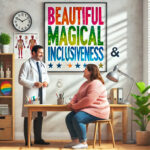Can journaling help you heal from your eating disorder?
Can journaling help you heal from your eating disorder?

by June Alexander
On December 11, when I receive my PhD (Philosophy) at a graduation ceremony, I will walk proudly. Above all, I want my award to signify hope for everyone who has lived with a long-term eating disorder. Hope for everyone, at every age. We can live a full life, and our diary or journal can help our healing process.
The 70 diarists who became my research participants for my PhD have shown that through the use of journal writing, we can not only help ourselves but also use the diary or journal as a resource to inform, educate and collaborate with our treatment teams. However, we urgently need more research and here I will explain why.
My creative work, The Diary Healer, published in 2016, explored the process involved in using excerpts from personal diaries to write a non-fictional book to assist people with eating disorders. The research process demonstrated how diary-writing could provide a coping tool and healing tool when experiencing an eating disorder.
Private self-help and therapeutic tool
Significantly, my book-writing process presented a way to explore and assess how diary-writing could be applied as a method of private self-help, and as a therapeutic tool in healthcare environments. Excerpts shared from personal diaries provided a means for exploring the private thoughts and feelings of multiple people experiencing an eating disorder, and for using this deeply intimate material to write a book.
Demonstrating that the diary could be used in this way was important because, while the diary had been discussed quite a lot in the eating disorder field, to my knowledge my project was the first to use multiple personal diaries to explore how diary excerpts could be used in writing a book to assist people with eating disorders. Furthermore, my project indicated diary excerpts were a useful means for presenting evidence of life experience; for example, excerpts illustrated the in-the-moment confusion and thought disruption that occurred between the body and identity when an eating disorder developed. The excerpts also presented a way to reveal and clarify epiphanies that became healing points. This sharing of confidential, person-centred information enabled the creation of a narrative illustrating the diary-writing process of documenting re-integration, reflection and facilitation of change within self.
Useful in the healthcare environment
The process of writing The Diary Healer demonstrated how application of diary-writing techniques and skills could contribute to understanding of self and the body, and re-integration of a self that was honest.
Significantly, my creative work has produced a resource to raise awareness and facilitate the use of diary-writing in the healthcare environment. Records of diarist experiences of therapeutic techniques contributed to the literature on the likely benefits and limitations of utilizing the diary as a self-help and collaborative healing method.
The diarist might describe, for example, illness symptoms as being helpful in managing daily stresses and yet be incapable of recognizing such thoughts or behaviors as unusual. The effective illustration of this experience through diary excerpts was significant in my book-writing process because it demonstrated how text could be read and interpreted differently, that is, through illness-driven thoughts or self-driven thoughts, depending on state of mind and recovery stage. Influences were shown to relate to the level of ego-syntonic and ego-dystonic thoughts* (see Notes), and my research project indicated that diary excerpts provided a significant means for exploring this complicated ambivalence.
Identifying secrets – sexual abuse
The identification of secrets as a major theme in the diary excerpts, and the ways in which diarists addressed secret-keeping, self-denial and shame, both literally and figuratively, indicated that the process of diary-writing could reveal deep insights that seemed unattainable in other ways into the illness experience.
For example, the data indicated sexual abuse was a highly delicate and sensitive issue, and diary excerpts could provide powerful and sensational individual accounts. However, it was important to place these stories in context. If one or more diarists have experienced sexual abuse, this does not necessarily mean that most people with an eating disorder have experienced such abuse. Conversely, many people who have experienced sexual abuse do not proceed to develop an eating disorder. Personal diary accounts provide a tool to help researchers investigate this area more fully. Established literature was found to be scant, exposing a need for deeper investigation of the impact of different forms of abuse in the development of eating disorders.
Unhelpful as well as helpful
My data also suggested that diary-writing could be unhelpful as well as helpful, indicating a need for more research on the use of the diary in person-centered and self-help health care.
Of particular concern was the revelation that the diary, without therapeutic guidance, was susceptible to uses that aligned with and strengthened the illness traits and, consequently, hindered efforts by the diarist to recover and heal. Notably, however, even when illness thoughts dominated diary entries, the research participants observed that their personal diary-writing had been helpful as a survival and coping tool, and a significant number considered the practice of writing as having a major role in healing from their eating disorder.
We need more research on the benefits of diary-writing as healing tool
This research finding raised the question whether professional guidance and mentoring in diary-writing could accelerate the healing process. This point was important because my Literature Review uncovered no evidence of this particular application of the diary in therapeutic settings. Some diarists confirmed they shared their diary or parts of entries with their therapist and it became a useful, collaborative engagement tool.
For instance, the patient wrote an entry in their diary, either with pen and paper or on-line, and the therapist responded by writing between the lines of the paper diary, sometimes in different colored pens, or in digital format such as e-mail or messaging, to intervene, guide and support the diarist in recognizing, confronting and dispelling illness thoughts as they arose. Evidence such as this merited further investigation, for example, on whether the style and format of text made a difference in helping the diarist to determine which thoughts were honest and which were of the illness.
Determination of whether on-line diary-like writing formats supported on-going recovery and re-immersion in mainstream life as effectively, or more effectively than the more private pen-and-paper diary, also was worthy of further consideration.
Notes:
* The process of recovery is particularly challenging for people with eating disorders because they are often severely affected by ego-dystonic and ego-syntonic thoughts, and become embroiled in a vicious cycle that is considered a key point in the enduring nature of this illness (Fairburn, Shafran, & Cooper, 1999); Schmidt and Treasure, 2006). An ego-dystonic thought is described by Purdon et al. (2007, p. 200) as ‘one that is perceived as having little or no context within one’s own sense of self or personality.’ For example, unable to verbalize they are too afraid to eat an ice-cream that a friend has bought, a person with anorexia nervosa may deliberately drop the ice-cream on the ground, and immediately feel deep shame at their behavior. Unwelcome and intrusive eating disorder thoughts like this can cause emotional distress and are resisted or suppressed because they are processed and experienced as problematic and threatening.
Ego-syntonic thoughts, feelings and behaviors, are those that are consistent with the self-view of the person. For instance, the feeling of intense hunger may be considered a positive sign of control over food, weight and body, and even persistent, uncomfortable urges to eat are experienced as a sign that one needs to and can endure hardships that others just do not have the special abilities to confront. Schmidt and Treasure (2006) postulate that such positive beliefs are a key factor in explaining the maintenance of an eating disorder. However, the same symptom, like a fixation on certain weight, can be experienced as both ego-syntonic, where there is a sense of greater self-control and motivation to achieve goals seen as positive, and ego-dystonic, where there is disruption in social activities and a lowering of mood, due in part to the preoccupation, if not obsession, with certain beliefs and anxieties. (Belloch, Roncero, & Perpiñá, 2012). Eating disorder patients in a study (Roncero, Belloch, Perpiñá, & Treasure, 2013) analyzing the extent to which unwanted eating intrusive thoughts about weight, diet, exercise and so on, are ego-syntonic and/or ego-dystonic, indicated that these thoughts were experienced as rational and simultaneously undesirable and immoral. This suggested that such thoughts were not fully ego-syntonic or ego-dystonic (p. 67), and future studies were recommended.
Such ego-dystonic and ego-syntonic thought dysfunction, according to Roncero, can deprive the patient of the ability to view their identity beyond that of their eating disorder.
References
Belloch, A., Roncero, M., & Perpiñá, C. (2012). Ego-syntonicity and ego-dystonicity associated with upsetting intrusive cognitions. Journal of Psychopathology & Behavioral Assessment, 34(1), 94-106. doi:10.1007/s10862-011-9255-4
Fairburn, C. G., Shafran, R., & Cooper, Z. (1999). A cognitive behavioural theory of anorexia nervosa. Behaviour Research and Therapy, 37(1), 1-13. doi:10.1016/S0005-7967(98)00102-8
Purdon, C., Cripps, E., Faull, M., Joseph, S., & Rowa, K. (2007). Development of a measure of egodystonicity. Journal of Cognitive Psychotherapy, 21(3), 198-216.
Roncero, M., Belloch, A., Perpiñá, C., & Treasure, J. (2013). Ego-syntonicity and ego-dystonicity of eating-related intrusive thoughts in patients with eating disorders. Psychiatry Research, 208(1), 67-73. doi:10.1016/j.psychres.2013.01.006
Schmidt, U., & Treasure, J. (2006). Anorexia nervosa: Valued and visible. A cognitive-interpersonal maintenance model and its implications for research and practice. British Journal of Clinical Psychology, 45(3), 343-366. doi:10.1348/014466505X53902





